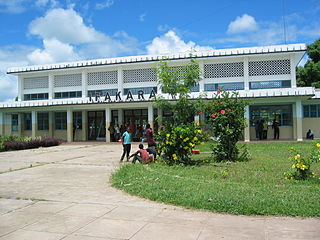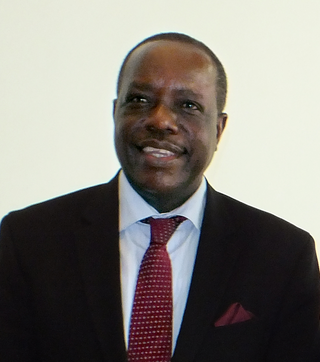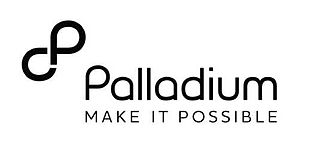
Tanzania, officially the United Republic of Tanzania, is a country in East Africa within the African Great Lakes region. It is bordered by Uganda to the northwest; Kenya to the northeast; the Indian Ocean to the east; Mozambique and Malawi to the south; Zambia to the southwest; and Rwanda, Burundi, and the Democratic Republic of the Congo to the west. Mount Kilimanjaro, Africa's highest mountain, is in northeastern Tanzania. According to the 2022 national census, Tanzania has a population of around 62 million.

Innovation is the practical implementation of ideas that result in the introduction of new goods or services or improvement in offering goods or services. ISO TC 279 in the standard ISO 56000:2020 defines innovation as "a new or changed entity, realizing or redistributing value". Others have different definitions; a common element in the definitions is a focus on newness, improvement, and spread of ideas or technologies.

The Department for International Development (DFID) was a ministerial department of the Government of the United Kingdom, from 1997 to 2020. It was responsible for administering foreign aid internationally.

The Wellcome Trust is a charitable foundation focused on health research based in London, United Kingdom. It was established in 1936 with legacies from the pharmaceutical magnate Henry Wellcome to fund research to improve human and animal health. The aim of the Trust is to "support science to solve the urgent health challenges facing everyone." It had a financial endowment of £29.1 billion in 2020, making it the fourth wealthiest charitable foundation in the world. In 2012, the Wellcome Trust was described by the Financial Times as the United Kingdom's largest provider of non-governmental funding for scientific research, and one of the largest providers in the world. According to their annual report, the Wellcome Trust spent GBP £1.1 billion on charitable activities across their 2019/2020 financial year. According to the OECD, the Wellcome Trust's financing for 2019 development increased by 22% to US$327 million.

Moshi is a municipality and the capital of Kilimanjaro region in the north eastern Tanzania. As of 2017, the municipality has an estimated population of 201,150 and a population density of 3,409 persons per km2. In the last official census of 2022, the municipality had a population of 221,733. The municipality is situated on the lower slopes of Mount Kilimanjaro, a dormant volcano that is the highest mountain in Africa. The name Moshi has been reported to refer to the smoke that emanates from the nearby mountain. The municipality covers about 59 square kilometres (23 sq mi) and is the smallest municipality in Tanzania by area.

Ifakara is a town in the Kilombero District, Morogoro Region, south central Tanzania. It is the headquarters of the Kilombero District administration and the main trading centre for Kilombero and Ulanga districts. The town is located near the Tanzania-Zambia Railway (TAZARA) line, at the edge of the Kilombero Valley, a vast swampland flooded by the mighty Kilombero River.
The Tanzania Commission for Science and Technology (COSTECH) is a parastatal organization affiliated with the government of Tanzania. It was created by an Act of the National Assembly of Tanzania in 1986 as a successor to the Tanzania National Scientific Research Council. The commission was a subsidiary institution to the Ministry of Communications, Science and Technology (MCST) and is now a subsidiary institution to the Ministry of Education, Science & Technology. The main offices are located in Dar es Salaam.

Tanzania has a hierarchical health system which is in tandem with the political-administrative hierarchy. At the bottom, there are the dispensaries found in every village where the village leaders have a direct influence on its running. The health centers are found at ward level and the health center in charge is answerable to the ward leaders. At the district, there is a district hospital and at the regional level a regional referral hospital. The tertiary level is usually the zone hospitals and at a national level, there is the national hospital. There are also some specialized hospitals that do not fit directly into this hierarchy and therefore are directly linked to the ministry of health.

M-PESA is a mobile phone-based money transfer service, payments and micro-financing service, launched in 2007 by Vodafone and Safaricom, the largest mobile network operator in Kenya. It has since expanded to Tanzania, Mozambique, DRC, Lesotho, Ghana, Egypt, Afghanistan, South Africa and Ethiopia. The rollouts in India, Romania, and Albania were terminated amid low market uptake. M-PESA allows users to deposit, withdraw, transfer money, pay for goods and services, access credit and savings, all with a mobile device.

Sospeter Mwijarubi Muhongo MP is a Tanzanian geologist and a nominated member of the Tanzanian Parliament.
BBC Media Action, formerly known as the BBC World Service Trust, is the BBC's international development charity, funded independently by external grants and voluntary contributions. The purpose of the organisation is to use media and communication to reduce poverty, improve health and support people in understanding their rights. It works in partnership with the BBC World Service and other local media and development partners in over 35 developing and transitional countries around the world.

Unlimit Health is an international organisation working to end parasitic disease. The organisation partners with affected countries, sharing evidence and expertise to eliminate preventable infections, through technical and financial support to ministries of health, in line with their strategies and plans, to strengthen health systems within affected communities.
The Ifakara Health Institute (IHI) is a health research organization with offices in Ifakara, Dar es Salaam, Ikwiriri, Bagamoyo, and Mtwara, Tanzania. The institute conducts health-related research in a variety of areas, including malaria and HIV/AIDS.
A Challenge Fund is a competitive financing facility to disburse donor funding for international development projects, typically utilizing public sector or private foundation funds for market-based or incentive driven solutions. As Irwin and Porteous (2005) observed, "In practice, the objective of a challenge fund is to provide the smallest possible financial contribution to a socially worthwhile project consistent with making it less risky and more financially sustainable to the private promoter." Applicant qualifications differ widely among challenge funds, but typically focus on non-state actors.
Grand Challenges Canada (GCC) is a Canadian nonprofit organization that employs a Grand Challenges model with the aim to fund solutions for health and economic problems in low-and middle-income countries and Canada.

Palladium is an international development sector advisory, management and implementation firm, representing the combination of seven prior companies: GRM International, Futures Group, Palladium, the IDL Group, Development & Training Services, HK Logistics and CARANA Corporation. As of October 2016, Palladium employs over 2,500 persons operating in 90 countries. At the end of 2015, Palladium International was the fourth-largest private sector partner for the UK Government's Department for International Development (DFID). During 2011, Palladium International members Futures Group and Carana were USAID's fourteenth and sixteenth largest private sector partners, respectively. At the end of 2012, GRM International was the third largest private sector partner for AusAID.
Science and technology in Tanzania describes developments and trends in higher education, science, technology, innovation policy, and governance in the United Republic of Tanzania since the turn of the century.

Fredros Okumu is a Kenyan parasitologist and entomologist, who currently works as director of science at the Ifakara Health Institute (IHI) in Tanzania. His primary research interests concern the interactions between humans and mosquitoes.
Tulanana Bohela is a Tanzanian entrepreneur, journalist and filmmaker. Her career spans close to 10 years, reporting in Tanzania and the East African region on TV, radio and digital for BBC Africa and BBC Swahili. She became the digital lead in Tanzania for the BBC World Service.

Anna Aloys Henga is a Tanzanian lawyer and human rights activist who is known for her social services including women empowerment initiatives such as coordinating anti-female genital mutilation in Tanzania. She became the executive director of Legal and Human Rights Center in 2018.













